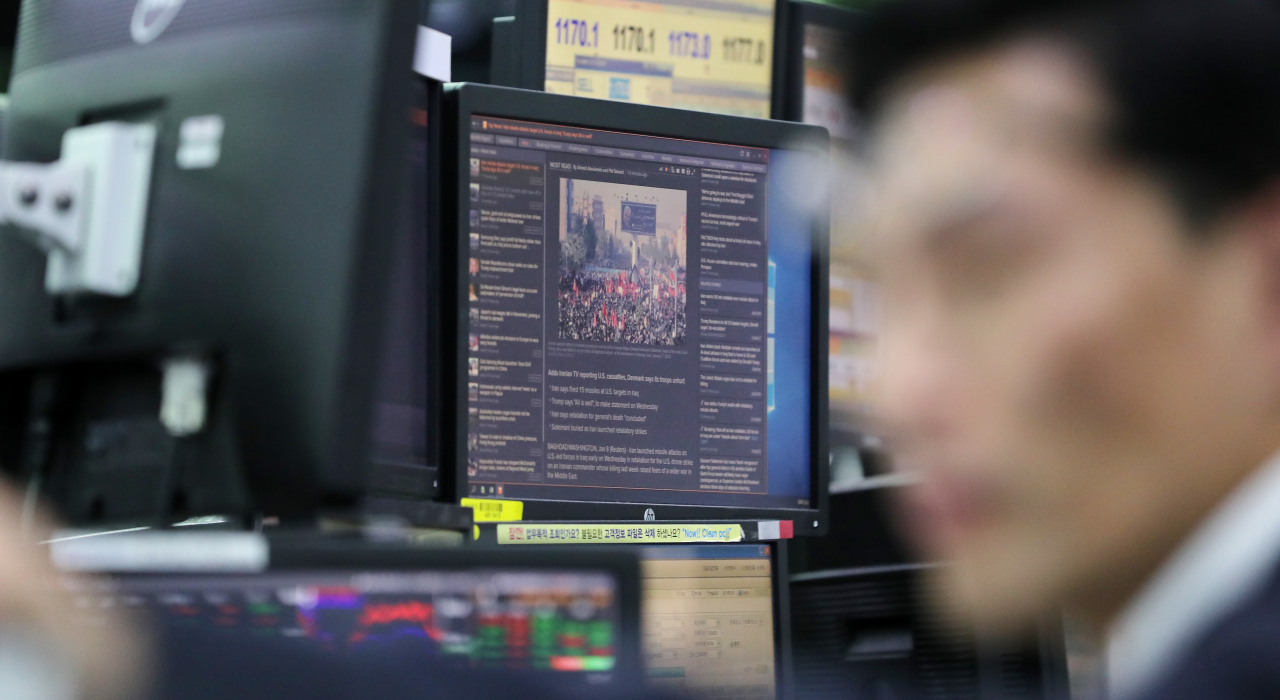To combat economic fears stemming from the escalating geopolitical tensions, the financial authorities have bolstered their monitoring and reiterated their commitment on Wednesday to swiftly stabilize the market via contingency plans if necessary.
Global markets were rattled by escalating tensions in the Middle East, as Iran fired more than a dozen ballistic missiles at a US air base in Iraq early Wednesday in retaliation for last week’s American drone strike to kill a top Iranian commander. This stoked worries of a wider war breaking out in the region.
 |
A monitor shows news related to Iran missile strike in the foreign exchange dealing room of the KEB Hana Bank headquarters in Seoul (Yonhap) |
The Bank of Korea forecast further volatility in the nation’s financial and foreign exchange markets, saying that the issue is likely to be brought up repetitively despite its belief that the current tensions would not lead to an armed conflict.
It detected an increase in volatility of financial and foreign exchange markets in early trading, which eventually became steadier. Similar reactions were observed in other Asian markets, it added.
The central bank’s observation came as a result of an emergency meeting presided over by BOK Senior Deputy Gov. Yoon Myun-shik.
The watchdog Financial Supervisory Service and policymaking Financial Services Commission also held emergency meetings and activated a special monitoring team. The government will cope with the situation through a set of contingency plans if necessary, they said.
Meanwhile, the nation’s benchmark Kospi shed 1.1 percent, while the won traded sharply down against the US greenback.
But the markets stabilized in the afternoon after Iranian Foreign Minister Mohammad Javad Zarif tweeted that Iran does “not seek escalation or war,” slightly cooling off the tensions.
After shedding more than 1 percent on overnight losses on Wall Street, the Kospi closed at 2,151.31 after a volatile day and the secondary Kosdaq also closed nearly 3 percent lower at 640.94. The Kospi fell below the 2,140-mark and the Kosdaq shed nearly 4 percent at one point.
The US stock market closed lower Tuesday with the Dow Jones Industrial Average shedding 0.42 percent to 28,583.68.
In early trading, the won was 1,179.30 against the US dollar, sharply down more than 1 percent from the previous trading. It recovered some ground and came to 1,170.80 won in the afternoon.
Treasury bond interest rates were also affected by the geopolitical tensions, as the yield on the most liquid three-year Treasury bonds fell by 2.3 basis points to 1.308 percent in early trading. But it inched back up to 1.363 percent in the afternoon, which was 3.2 basis points higher than the previous trading.
The benchmark 10-year yield ended 1.7 basis points higher at 1.63 percent after dipping to 1.578 percent earlier.
Gold prices also rose nearly 3 percent from the previous trading session to 60,319.81 won around 11 a.m., breaching 60,000 won for the first time since Aug. 29, when tensions between the US and China had escalated. The price increase reflects investors’ increased appetite for low-risk assets in times of uncertainties.
A day after the Ministry of Economy and Finance said the tensions would have limited impact on domestic oil supplies.
Global oil prices surged more than 4 percent following the news of Iran’s attack on US troops. US West Texas Intermediate crude futures rose 4.5 percent, or $2.85, to a session high of $65.65, its highest level since April, before dropping back to $64.11. International benchmark Brent crude spiked more than 4 percent to a session high of $71.75 per barrel, its highest since September, before pulling back to $69.86.
The Middle East accounted for 70 percent of Korea’s imports of crude oil in the January-November period last year, and an estimated 38 percent of its liquefied natural gas shipments were from the region.
The Korean government said it would consider the release of the country’s strategic oil reserves if necessary under the current circumstances.
By Jung Min-kyung (
mkjung@heraldcorp.com)




![[Herald Interview] 'Trump will use tariffs as first line of defense for American manufacturing'](http://res.heraldm.com/phpwas/restmb_idxmake.php?idx=644&simg=/content/image/2024/11/26/20241126050017_0.jpg)

![[Health and care] Getting cancer young: Why cancer isn’t just an older person’s battle](http://res.heraldm.com/phpwas/restmb_idxmake.php?idx=644&simg=/content/image/2024/11/26/20241126050043_0.jpg)

